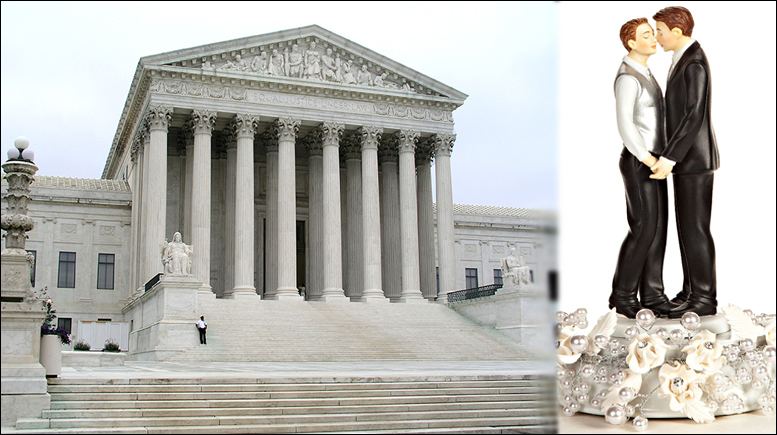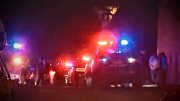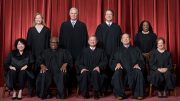By: Chris Gilmore/TRT Reporter—
The U.S. Supreme Court, in a 7-2 vote, backed the Colorado baker who refused to bake a cake for a same-sex couple (Masterpiece Cakeshop v. Colorado Civil Rights Commission) due to religious objections. The Colorado Civil Rights Commission had formerly ruled that the bakery had violated the rights of a same-sex couple when they denied baking the cake. Today’s decision, written by Justice Anthony Kennedy, overturns the Commission’s ruling on the grounds that it showed animus against the baker’s (Jack Phillips) religion in this case.
“Today’s Supreme Court decision in Masterpiece Cakeshop is a narrow, fact-based decision that does not break any new constitutional ground or create any new exemptions to anti-discrimination laws,” said NCLR’s Legal Director Shannon Minter, via a press release. “The Court reversed the state court decision only because it found that the record, in this case, indicated that the Colorado Commission’s deliberations were tainted by anti-religious hostility. Nothing in the Court’s decision would require or permit the Commission to have reached a different substantive result in protecting the LGBTQ community from discrimination.
The decision leaves intact the longstanding principle that states can require businesses open to the public to serve everyone, even when some businesses believe that doing so violates their religious beliefs.”
The Supreme Court’s decision also recognized the detriment of discrimination and left intact Colorado’s LGBTQ-inclusive nondiscrimination protections, as well as similar protections in 19 states and 200+ cities and towns.
“While I don’t agree with the entire ruling issued today by the Supreme Court, I’m heartened that the Court upheld the basic rights of states to protect LGBTQ people from discrimination,” said Jerame Davis, Executive Director of Pride at Work. “LGBTQ people should not have to worry if they will face discrimination by businesses open to the public and while this case may muddy the waters a bit, the fundamentals of state laws designed to protect LGBTQ people remain intact.”
Statement from Congressman Joe Kennedy III
Allowing exemptions to our civil rights ignores the painful lessons of our nation’s past. Today’s Supreme Court ruling sends a dangerous signal to those across the country who wish to use religious freedom as a sword rather than a shield,” said Congressman Joe Kennedy III, via a press release. “Most critically, today’s decision underscores the urgent need for nationwide non-discrimination protections to ensure no one who calls America home is denied services, opportunity or basic dignity simply because of who they are.”
Statement of Mary L. Bonauto
Mary Bonauto is the Civil Rights Project Director for GLBTQ Legal Advocates & Defenders (GLAD). She successfully argued the marriage equality case Obergefell v. Hodges before the Supreme Court in 2015.
This ruling forthrightly affirms the validity of anti-discrimination laws that protect classes of persons when they seek goods and services on the same terms as others in the public marketplace. “As a general rule,” the Court stated, religious or philosophical objections to other people “do[es] not allow business owners” or economic or societal actors” to deny protected persons equal access to goods and services” or to “put up signs” excluding them. This ruling rejected the central premise of the Cakeshop and U.S. Department of Justice, both of which sought to use religion and free speech to justify discrimination against a gay couple.
Ironically, the Bakeshop and baker technically won, but only because the Supreme Court ruled that they had not received “neutral and respectful consideration” of their arguments by the state commission that heard and decided their case. To that end, the Court cited comments made by Commissioners on the case that the Court said denigrated religion, suggested incompatibility between being a person of faith and person in business, and noted what it said was a possible inconsistency with the Commission’s precedents. In any event, this limited ruling provides no basis for this Bakeshop or other entities covered by anti-discrimination laws to refuse goods and services in the name of free speech or religion.
The Court was mindful of how far adrift we could go if every individual could apply his or her religious beliefs to every commercial transaction. The Court contrasted permission for a clergy person to refuse to marry a couple as an exercise of religious belief, on the one hand, with the unacceptable “community-wide stigma” that would befall gay people if there was a general constitutional right to refuse to provide goods and services.
Looking forward from here, the majority of the Court—those in the majority as well as Justices Ginsburg and Sotomayor—stood on the side of “civil rights laws that ensure equal access to goods, services, and public accommodations.” In applying those laws, neither a person’s religion nor their sexual orientation should affect the administration of justice. As the Court stated in its penultimate paragraph, “disputes must be resolved with tolerance, without undue disrespect to sincere religious beliefs, and without subjecting gay persons to indignities when they seek goods and services in an open market.”
The decision may generate mixed feelings in our community. After all, we can’t lose sight of the fact that the couple, in this case, David Mullins and Charlie Craig, were, in fact, turned away because of who they are. Our anti-discrimination protections remain vitally important, and we seek explicit protections for LGBTQ people throughout the country.
We urge the LGBTQ community and others to remain confident in going about their business, working, attending school, marrying, and raising their children. We believe the Constitution still requires as much.
For more information about the ruling, click here.







